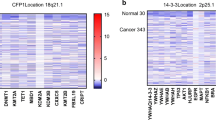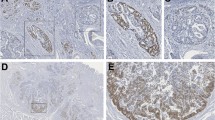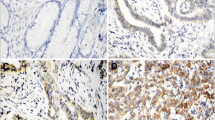Abstract
Cyclooxygenase-2 (COX-2) is an important factor in gastric carcinogenesis, and COX-2 expression in gastric cancer patients correlates with prognosis. We have now studied the impact of COX-2 in comparison to six other tissue tumor markers, DNA index, and S-phase fraction (SPF) in a large series of gastric cancer specimens. From 342 consecutive patients, 337 archival tissue specimens were available for immunohistochemistry of COX-2, HuR, cyclin A, MMP-2, p53, p21, and Ki-67 and 313 for analysis of DNA index and S-phase fraction by flow cytometry. Associations between factors were assessed by chi-square test and survival analysis by the Kaplan–Meier method and Cox model. A significant association emerged between of COX-2 and p53 (p < 0.0001), Ki-67 (p = 0.013), DNA ploidy (p < 0.0001), and SPF (p < 0.0001). In an extended multivariate analysis, COX-2 and p53 expression were independent prognostic factors for poor survival, in addition to high stage and non-curative surgery. In gastric cancer, COX-2 expression associated with markers for apoptosis and proliferation, and furthermore, it was confirmed that COX-2 and p53 are strong prognostic indicators.


Similar content being viewed by others
References
Kountouras J, Zavos C, Chatzopoulos D. Apoptotic and anti-angiogenic strategies in liver and gastrointestinal malignancies. J Surg Oncol. 2005;90(4):249–59.
Mann JR, DuBois RN. Cyclooxygenase-2 and gastrointestinal cancer. Cancer J. 2004;10(3):145–52.
Wang D, Dubois RN. Prostaglandins and cancer. Gut. 2006;55(1):115–22.
Oshima H, Oshima M, Inaba K, Taketo MM. Hyperplastic gastric tumors induced by activated macrophages in COX-2/mPGES-1 transgenic mice. EMBO J. 2004;23:1669–78.
Saukkonen K, Tomasetto C, Narko K, Rio MC, Ristimaki A. Cyclooxygenase-2 expression and effect of celecoxib in gastric adenomas of trefoil factor 1-deficient mice. Cancer Res. 2003;63(12):3032–6.
Lim HY, Joo HJ, Choi JH, Yi JW, Yang MS, Cho DY, et al. Increased expression of cyclooxygenase-2 protein in human gastric carcinoma. Clin Cancer Res. 2000;6(2):519–25.
Saukkonen K, Nieminen O, van Rees B, Vilkki S, Harkonen M, Juhola M, et al. Expression of cyclooxygenase-2 in dysplasia of the stomach and in intestinal-type gastric adenocarcinoma. Clin Cancer Res. 2001;7(7):1923–31.
van Rees BP, Saukkonen K, Ristimaki A, Polkowski W, Tytgat GN, Drillenburg P, et al. Cyclooxygenase-2 expression during carcinogenesis in the human stomach. J Pathol. 2002;196(2):171–9.
Ristimaki A, Honkanen N, Jankala H, Sipponen P, Harkonen M. Expression of cyclooxygenase-2 in human gastric carcinoma. Cancer Res. 1997;57(7):1276–80.
Saukkonen K, Rintahaka J, Sivula A, Buskens CJ, Van Rees BP, Rio MC, et al. Cyclooxygenase-2 and gastric carcinogenesis. Apmis. 2003;111(10):915–25.
Li JY, Wang XZ, Chen FL, Yu JP, Luo HS. Nimesulide inhibits proliferation via induction of apoptosis and cell cycle arrest in human gastric adenocarcinoma cell line. World J Gastroenterol. 2003;9(5):915–20.
Mrena J, Wiksten JP, Thiel A, Kokkola A, Pohjola L, Lundin J, et al. Cyclooxygenase-2 is an independent prognostic factor in gastric cancer and its expression is regulated by the messenger RNA stability factor HuR. Clin Cancer Res. 2005;11(20):7362–8.
Steele RJ, Lane DP. P53 in cancer: a paradigm for modern management of cancer. Surgeon. 2005;3(3):197–205.
Schwartz GK. Development of cell cycle active drugs for the treatment of gastrointestinal cancers: a new approach to cancer therapy. J Clin Oncol. 2005;23(20):4499–508.
Gartel AL, Radhakrishnan SK. Lost in transcription: p21 repression, mechanisms, and consequences. Cancer Res. 2005;65(10):3980–85.
Endl E, Gerdes J. The Ki-67 protein: fascinating forms and an unknown function. Exp Cell Res. 2000;257(2):231–7.
Baba H, Korenaga D, Kakeji Y, Haraguchi M, Okamura T, Maehara Y. DNA ploidy and its clinical implications in gastric cancer. Surgery. 2002;131(1 Suppl):S63–70.
Korenaga D, Okamura T, Saito A, Baba H, Sugimachi K. DNA ploidy is closely linked to tumor invasion, lymph node metastasis, and prognosis in clinical gastric cancer. Cancer. 1988;62(2):309–13.
Victorzon M, Roberts PJ, Haglund C, von Boguslawsky K, Nordling S. Ki-67 immunoreactivity, ploidy and S-phase fraction as prognostic factors in patients with gastric carcinoma. Oncology. 1996;53(3):182–91.
Kononen J, Bubendorf L, Kallioniemi A, Barlund M, Schraml P, Leighton S, et al. Tissue microarrays for high-throughput molecular profiling of tumor specimens. Nat Med. 1998;4(7):844–7.
Mrena J, Wiksten JP, Kokkola A, Nordling S, Haglund C, Ristimaki A. Prognostic significance of cyclin A in gastric cancer. Int J Cancer. 2006;119(8):1897–901.
Mrena J, Wiksten JP, Nordling S, Kokkola A, Ristimaki A, Haglund C. MMP-2 but not MMP-9 associated with COX-2 and survival in gastric cancer. J Clin Pathol. 2006;59(6):618–23.
Wiksten JP, Lundin J, Nordling S, Kokkola A, Haglundi C. Comparison of the prognostic value of a panel of tissue tumor markers and established clinicopathological factors in patients with gastric cancer. Anticancer Res. 2008;28(4C):2279–87.
Yonemura Y, Ooyama S, Sugiyama K, Kamata T, De Aretxabala X, Kimura H, et al. Retrospective analysis of the prognostic significance of DNA ploidy patterns and S-phase fraction in gastric carcinoma. Cancer Res. 1990;50(3):509–14.
Setala LP, Nordling S, Kosma VM, Lipponen PK, Eskelinen MJ, Hollmen SM, et al. Comparison of DNA ploidy and S-phase fraction with prognostic factors in gastric cancer. Anal Quant Cytol Histol. 1997;19(6):524–32.
Abad M, Ciudad J, Rincon MR, Silva I, Paz-Bouza JI, Lopez A, et al. DNA aneuploidy by flow cytometry is an independent prognostic factor in gastric cancer. Anal Cell Pathol. 1998;16(4):223–31.
Russo A, Bazan V, Migliavacca M, Zanna I, Tubiolo C, Tumminello FM, et al. Prognostic significance of DNA ploidy, S-phase fraction, and tissue levels of aspartic, cysteine, and serine proteases in operable gastric carcinoma. Clin Cancer Res. 2000;6(1):178–84.
Yasa MH, Bektas A, Yukselen V, Akbulut H, Camci C, Ormeci N. DNA analysis and DNA ploidy in gastric cancer and gastric precancerous lesions. Int J Clin Pract. 2005;59(9):1029–33.
Subbaramaiah K, Altorki N, Chung WJ, Mestre JR, Sampat A, Dannenberg AJ. Inhibition of cyclooxygenase-2 gene expression by p53. J Biol Chem. 1999;274(16):10911–5.
Leung WK, To KF, Ng YP, Lee TL, Lau JY, Chan FK, et al. Association between cyclo-oxygenase-2 overexpression and missense p53 mutations in gastric cancer. Br J Cancer. 2001;84(3):335–9.
Shun CT, Wu MS, Huang SP, Wang HP, Chuang SM, Lin JT. Cyclooxygenase-2 expression correlates with nuclear p53 accumulation in gastric carcinoma. Hepatogastroenterology. 2003;50(52):988–92.
Kawabe A, Shimada Y, Uchida S, Maeda M, Yamasaki S, Kato M, et al. Expression of cyclooxygenase-2 in primary and remnant gastric carcinoma: comparing it with p53 accumulation, Helicobacter pylori infection, and vascular endothelial growth factor expression. J Surg Oncol. 2002;80(2):79–88.
Joo YE, Chung IJ, Park YK, Koh YS, Lee JH, Park CH, et al. Expression of cyclooxygenase-2, p53 and Ki-67 in gastric cancer. J Korean Med Sci. 2006;21(5):871–6.
Xu L, Zhang SM, Wang YP, Zhao FK, Wu DY, Yan X. Relationship between DNA ploidy, expression of ki-67 antigen and gastric cancer metastasis. World J Gastroenterol. 1999;5(1):10–1.
Kunisaki C, Shimada H, Takahashi M, Ookubo K, Moriwaki Y, Akiyama H, et al. Prognostic factors in early gastric cancer. Hepatogastroenterology. 2001;48(37):294–8.
Liu XP, Tsushimi K, Tsushimi M, Kawauchi S, Oga A, Furuya T, et al. Expression of p21(WAF1/CIP1) and p53 proteins in gastric carcinoma: its relationships with cell proliferation activity and prognosis. Cancer Lett. 2001;170(2):183–9.
Oshima CT, Iriya K, Forones NM. Ki-67 as a prognostic marker in colorectal cancer but not in gastric cancer. Neoplasma. 2005;52(5):420–4.
Ochiai H, Nakanishi Y, Fukasawa Y, Sato Y, Yoshimura K, Moriya Y, et al. A new formula for predicting liver metastasis in patients with colorectal cancer: immunohistochemical analysis of a large series of 439 surgically resected cases. Oncology. 2008;75(1-2):32–41.
Kim YJ, Kim MA, Im SA, Kim TM, Kim DW, Yang HK, et al. Metastasis-associated protein S100A4 and p53 predict relapse in curatively resected stage III and IV (M0) gastric cancer. Cancer Invest. 2008;26(2):152–8.
Acknowledgments
Technical assistance of Päivi Peltokangas, Tuija Hallikainen, Elina Laitinen, and Elina Aspiala is warmly acknowledged. This study has been supported by grants from the Finnish Cancer Society, Finska Läkaresällskapet, Medicinska Understödsföreningen Liv och Hälsa, Helsinki University Research Funds, Helsinki University's Research Funds, the Academy of Finland, and the Sigrid Jusélius Foundation.
Competing interests
There are no financial relationships resulting in an actual, potential or apparent conflict of interest with regard to this manuscript.
Authors’ contributions
JM participated in immunostaining of tissue samples, carried out the immunohistochemical scoring and drafted the manuscript. J-PW participated in collection of clinical data and performed statistical analysis. AK collected clinical data and helped with study design. SN, as senior pathologist, confirmed scoring of immunostainings, carried out TNM staging, and made possible preparation of representative tissue microarray sections. AR and CH conceived and coordinated the study and performed the final drafting of the manuscript, and stainings were performed in the laboratory of CH.
Author information
Authors and Affiliations
Corresponding author
Additional information
Ari Ristimäki and Caj Haglund have equal last authorship.
Rights and permissions
About this article
Cite this article
Mrena, J., Wiksten, JP., Kokkola, A. et al. COX-2 is associated with proliferation and apoptosis markers and serves as an independent prognostic factor in gastric cancer. Tumor Biol. 31, 1–7 (2010). https://doi.org/10.1007/s13277-009-0001-4
Received:
Accepted:
Published:
Issue Date:
DOI: https://doi.org/10.1007/s13277-009-0001-4




